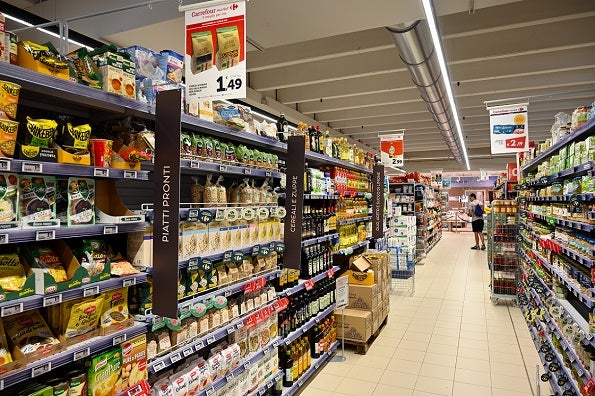[ad_1]

FMCG associations in Italy have submitted a letter of intent to the government to effectively urge food manufacturer members to cut prices.
In a joint statement from Centromarca, Federalimentare, IBC and the Italian Food Union, the associations said they met with the Ministry of Business and Made in Italy today (8 September) to “identify initiatives aimed at counteracting the negative effects of inflation on consumers and families”.
A combined letter of intent was forthcoming from that meeting, provided to Minister Adolfo Urso, who heads up the Ministry of Enterprises and Made in Italy (Mimit), with the aim of coming up with measures to tackle inflation.
First on the list is an agreement by the four groups to provide information to their members “on every initiative developed by the Ministry regarding the fight against inflation”.
They will ask members to voluntarily develop – “in compliance with free competition” – measures “aimed at counteracting” inflation for the October-to-December period. And, the statement added, “where it is considered practicable by the individual company from the point of view of its economic sustainability”.
Any forthcoming initiatives should then be proposed by the food producers to “large-scale retail trade companies, in strict compliance with the legislation on unfair commercial practices in the agri-food supply chain”.
The statement added: “In compliance with the freedom of strategy mentioned above, each company will evaluate the impact, positively or negatively, on its economic accounts caused by the trend in production costs, influenced by the price of raw materials, energy, logistics and packaging.”
All-party involvement
A meeting has been suggested by the four groups, to be hosted by Minister Urso, in which the entire supply chain should be involved, including processors and raw materials suppliers, energy and logistics companies, and packaging and distribution representatives.
Francesco Mutti, president of Centromarca, and Flavio Ferretti, president of IBC, said in the joint statement: “The fight against inflation and the protection of the purchasing power of families, in a particularly delicate phase of the economic situation, is a priority for the industrial fabric of the country.
“Minister Urso’s desire to involve all the components of the supply chain in a common effort was decisive in catalysing the broad discussion. We hope that Mimit will convene the working table as soon as possible, so as to be able to focus on and address the countless critical issues that generate inefficiencies and therefore costs within the consumer goods supply chain.”
Noted in the letter of intent, according to today’s statement, are the economic challenges “consumer goods companies” are facing: the across-the-board supply chain inflation, energy costs, the impact of the Ukraine war on raw materials supplies, and weather conditions in Italy.
Inflation in Italy cooled to 5.5% in August, from 5.9% on an annualised basis. It was the lowest since January 2022. Processed food inflation stood at 10.1%, easing from 10.5%. The rate for unprocessed food was 9.2%, compared to 10.4%.
The industry bodies also referenced the fact not all the input-cost inflation has been passed on by manufacturers in Italy as they try to find a balance between protecting their businesses and jobs, and supporting consumer demand.
A United Nations’ report today on food commodity prices showed sugar and rice bucked the declines in other items such as meat and dairy in August. Nevertheless, the average price of five commodities has come down from a peak in March 2022.
Portugal, meanwhile, has extended a zero VAT holiday on essential food items to the end of the year to help consumers wit the cost of living.
Another European country, France, has also taken measures to combat high food costs, reaching an agreement with producers last month to either freeze or cut prices on a range of goods, including food.
However, France Finance Minister Bruno Le Maire has said some manufacturers are not doing enough to help the fight against inflation, pointing to Nestlé, PepsiCo and Unilever as being among companies not toeing the line.
[ad_2]
Source link
